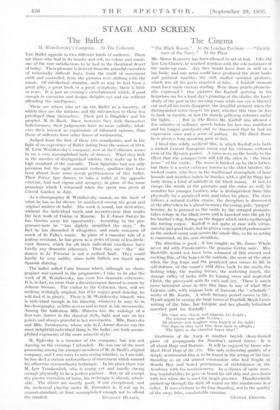STAGE AND SCREEN The Ballet
M. Woizikovsky's Company. At The Coliseum
Tim Ballet appeals to two different kinds of audience. There are those who find in its beauty and wit, its colour and music, one of the rare satisfactions to be had in the theatrical desert of today. Their pleasure is derived from the graceful execution of technically difficult feats, from the thrill of movement swift and controlled, from the pictures ever shifting with the music. Of intellectual stimulus, such as may be had from a great play, a great book or a great symphony, there is little or none. It is just an evening's entertainment which, if good enough in execution and design, delights eye and ear without offending the intelligence.
' There are others who set up the Ballet as a mystery, of which they are the initiates and the' interpreters to those less privileged than themselves. Their god is Diaghilev and his prophet, M. de Basil. Since, however, they style themselves balletomanes, their judgements have no more validity, what- ever their interest as expressions of informed opinion, than those of sufferers from other forms of monomania.
Judged from the first of these two standpoints, and in the light of an experience of Ballet dating from the season of 1914, M. Leon Woizikovsky's cornpany; now at the CbliseuM, seems to me a very accomplished body of dancers: What they lack in the number of distinguished soloists, they make up in the
high standard of the ensemble. Their Sylphides had not only
precision but the right moonlit ecstasy, qualities that have been absent from some recent performances of this ballet.
Their Prince Igor dances, to take a ballet at the opposite extreme, had real vigour and savagery, in place of the tame praneings which I witnessed when the opera was given at Covent Garden in July.
As a chiaregrapher M. Woizikovsky cannot, on the basis of what he has so far shown, be numbered among the great and
original maitres de ballet. His work is sound, but derivative, without the individual touch and inventiveness that marks the best work of Fokine or Massine. In L'Amour Soreier he
has thrown away his opportunity. According to the pro- gramme-note he " has slightly simplified the story." In fact he has discarded it altogether, and made ,nonsense of much of de Falla's music. In place of a macabre tale of a
jealous revenant, he has given us a series of more or less irrele- vant dances, which for. all their individual excellence have hardly any dramatic coherence. That they are " like " the dances in Le Tricorne is not a radical fault. They could hardly be very unlike, since both ballets are based upon Spanish dancing. , The ballet called Valse Strauss which, although no chore- grapher was named in the programme, I take to be also the work of M. Woizikovsky, has even less dramatic coherence.
It is, in fact, no more than a divertissement danced to music by Johann Strauss. The visitor to the Coliseum, then, will see
nothing strikingly original.; but if he enjoys good dancing, he will find it in plenty. There is M. Woizikoysky hiMself, who is individual enough in his dancing, whatever he may be in his choregraphy, as lithe as ever and as taut in his movements.
Aniong the ballerinas Mlle. Blinova has the makings of a first-rate dancer in the classical style, light and sure on her
points and always graceful in her movements. Mlle. Raievska and Mlle. Tarakanova, whose solo in L'Amour Sorcier was the most delightful individual thing in the ballet, are both accom- plished exponents of the more mimetic style.
M. Eglevsky is a member of the company, but was not dancing on the evenings I attended. He was one of the most promising among the younger members of M. de Basil's original company, and I was sorry to miss seeing whether, as I am told, he has shed a certain awkwardness of movement which marred his otherwise extraordinary technique. In his place there was M. Igor Youskewitch, who is young yet and hardly strong enough physically to be a perfect partner. But, in all except the precise execution of turns, his technique is already admir- able. The decors are mostly good, if not exceptional, and the orchestral playing under. M. Fistoulari is, if not up to concert-standard, at least accomplished enough not to offend






































 Previous page
Previous page